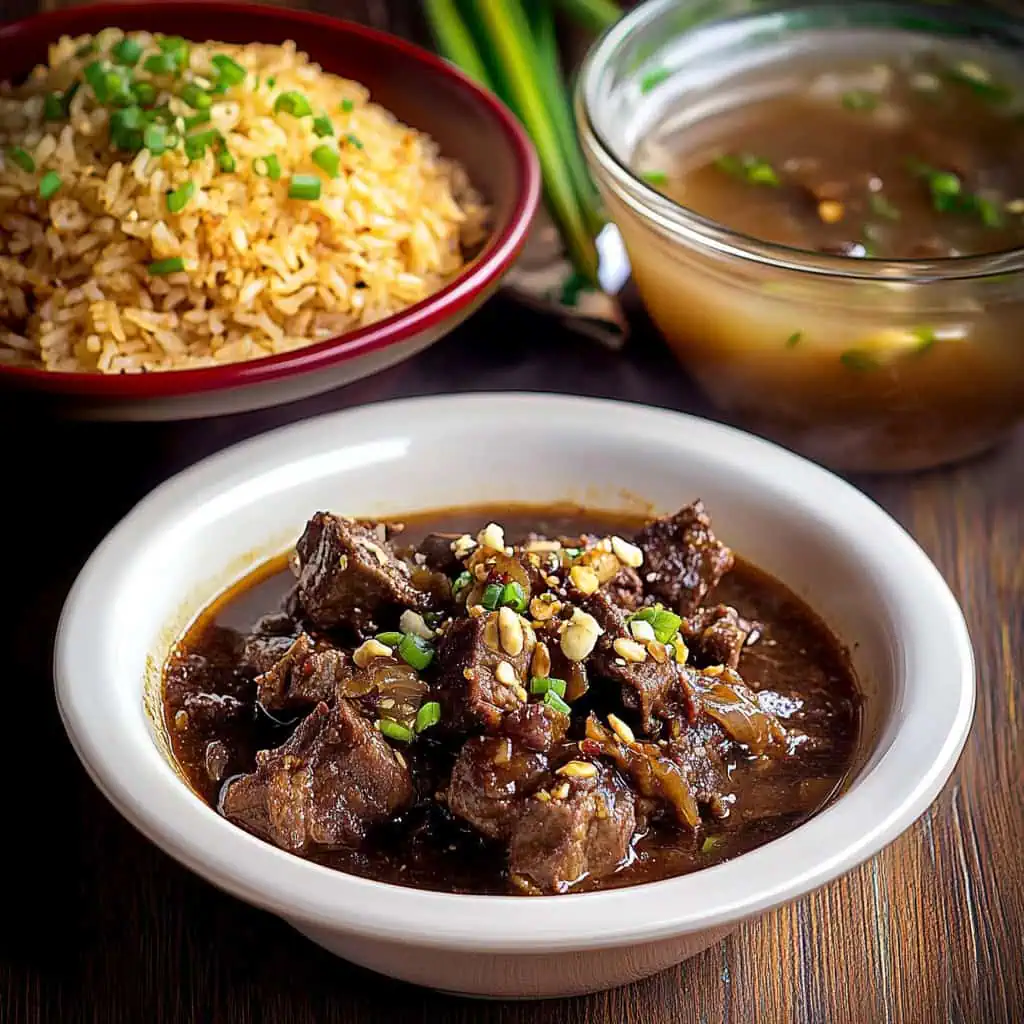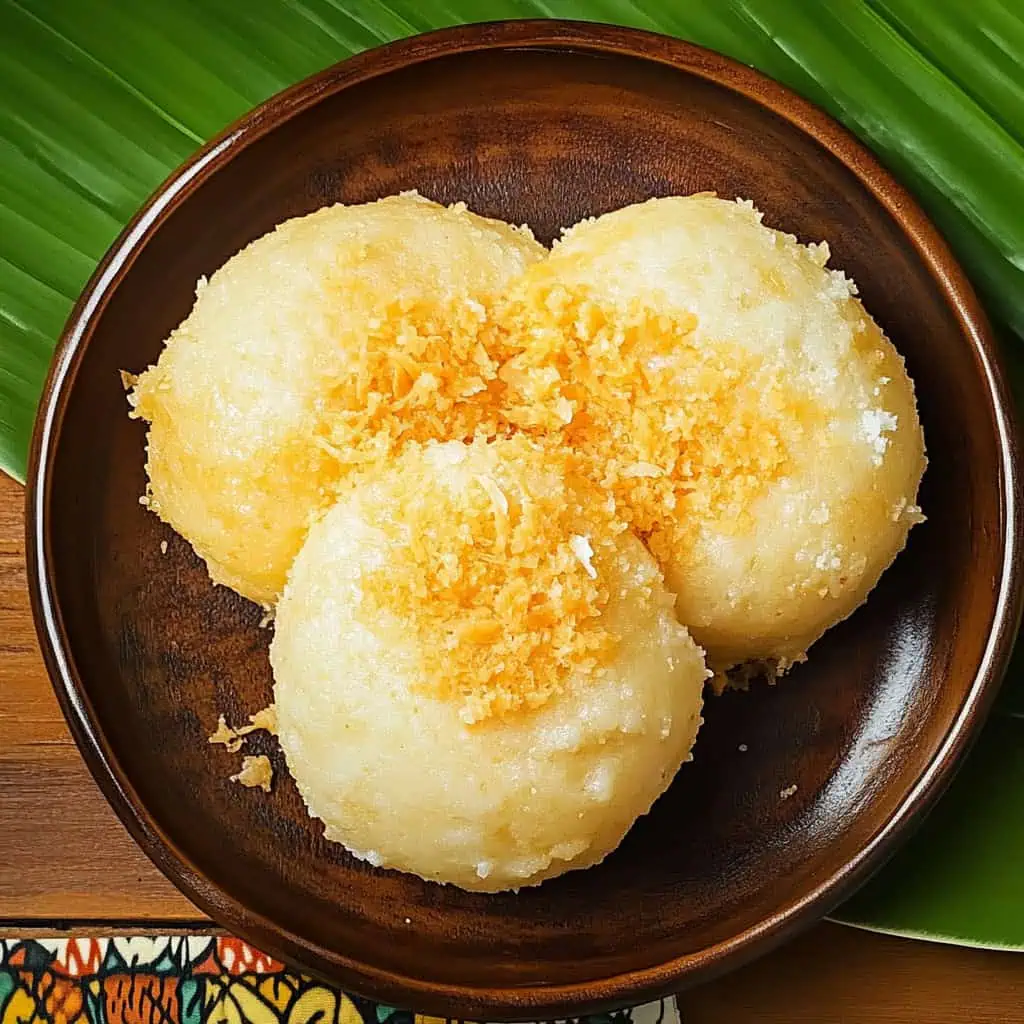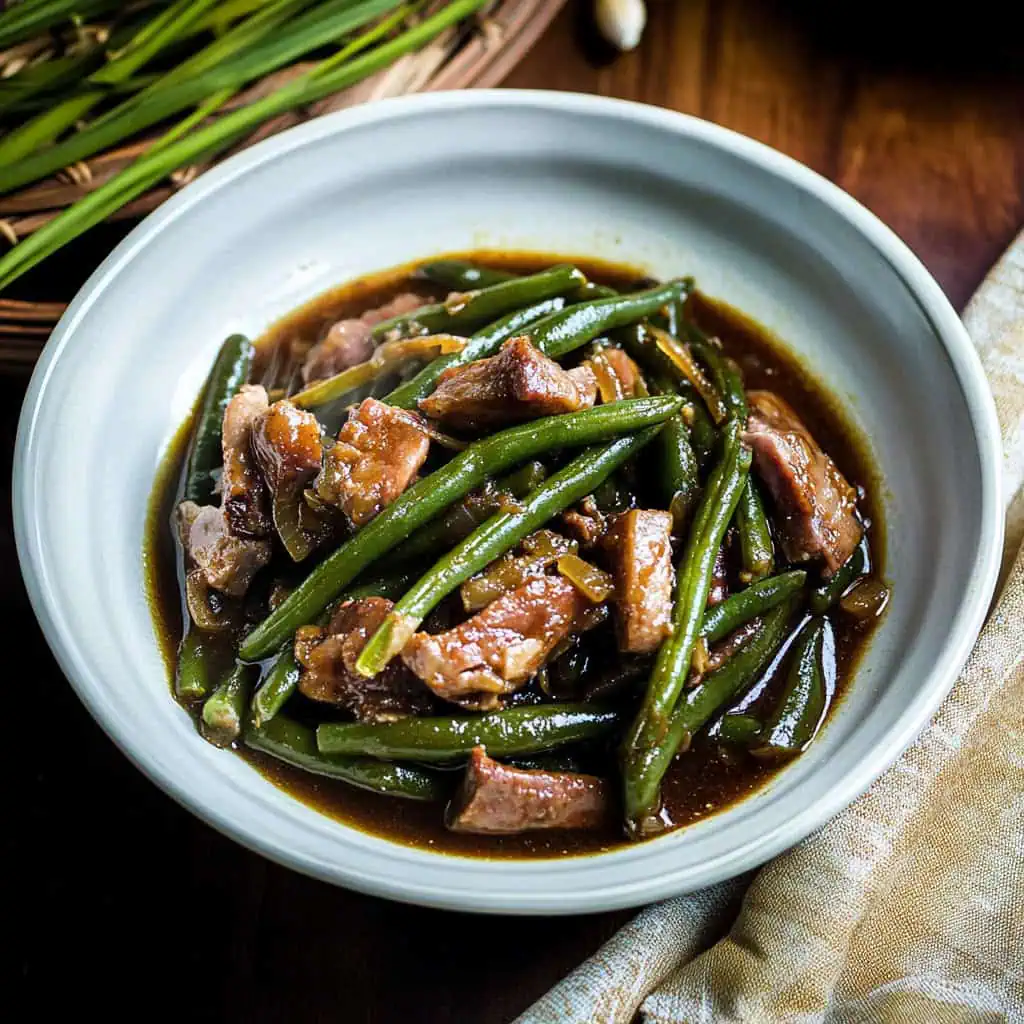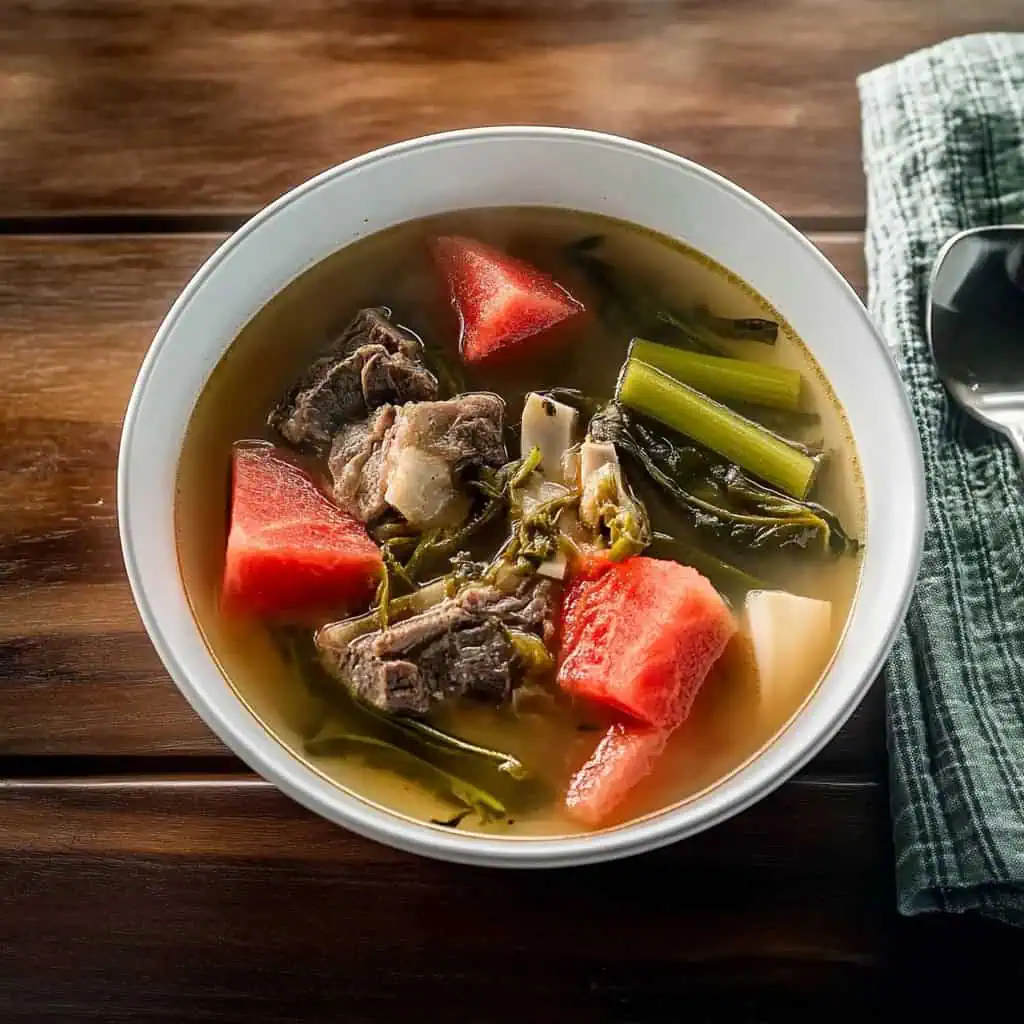Beef Pares was always our 3 AM salvation after a long night of inuman with friends. I always enjoy sliding into those plastic chairs at a humble pares house, the steam from the soup clearing your head while the tender, sweet-savory beef and garlic rice comfort your soul (and yes, help prevent that incoming hangover).
After years of these early morning food runs, I finally learned to make this iconic Filipino comfort food at home, and let me tell you - this recipe brings back all those wonderful memories, minus the wobbly plastic chairs.
This homemade Filipino beef pares recipe captures that perfect street food taste we all know and love.
What Is Beef Pares?
Beef Pares emerged from the bustling streets of Manila in the 1970s, originating in Retiro Street, Quezon City. The name "pares" (meaning "pairs" in Filipino) refers to the classic pairing of tender beef asado with sinangag (garlic fried rice), though it's actually served as a trio with essential beef broth completing the meal.
Jump to:
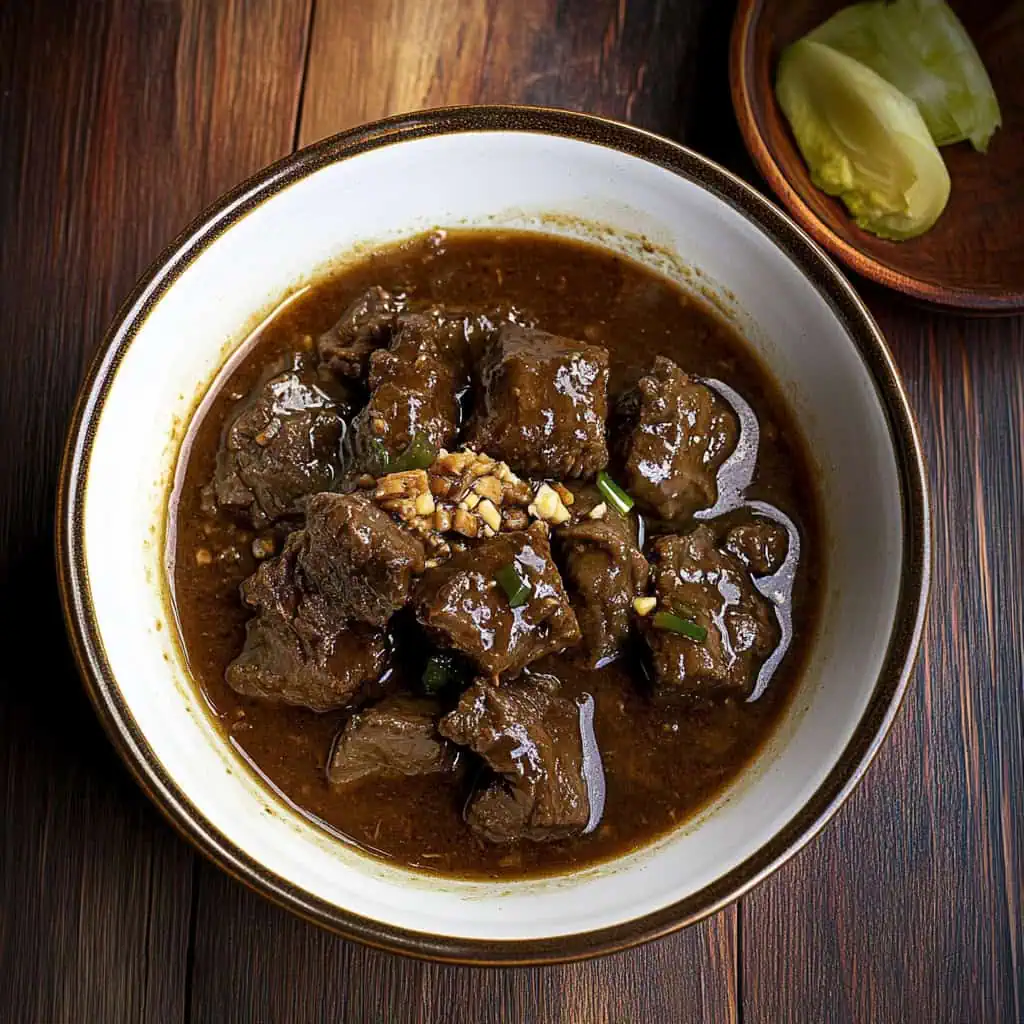
Why You'll Love This Recipe
- Perfect balance of sweet, savory, and umami flavors from tender beef and aromatic broth
- Three-in-one comfort meal: braised beef, garlic rice, and soul-warming soup
- Restaurant-quality dish made affordable at home
- Meal prep friendly - tastes even better the next day
- Impressive enough for special occasions yet simple enough for family dinners
Ingredients
This Beef Pares recipe relies on traditional Filipino ingredients that build layers of flavor while honoring its street food origins. Beef brisket is selected for its perfect balance of meat and fat, which becomes tender during slow cooking.
Star anise, ginger, and bay leaves infuse the dish with aromatic depth, while the combination of soy sauce and brown sugar creates that signature sweet-savory profile Filipinos love. Whole peppercorns add gentle heat without overwhelming the dish.
Day-old rice is specifically used for the garlic rice because its slightly dried texture prevents clumping and absorbs the nutty garlic flavor beautifully.
Each ingredient plays an essential role in achieving the authentic comfort food experience that makes Beef Pares a beloved Filipino classic.
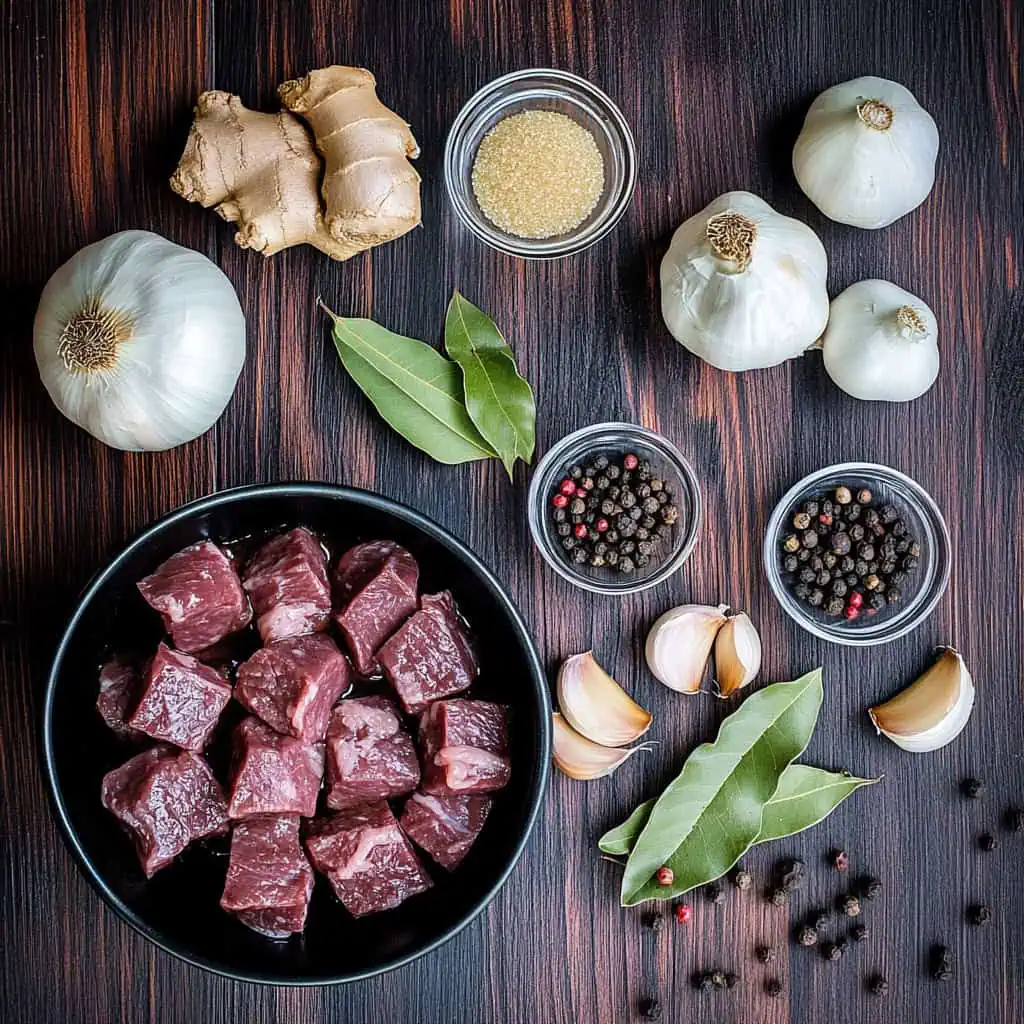
For the Broth (Sabaw):
- 2 pounds beef brisket, cut into 1½-inch cubes
- 6 cups water
- 1 large white onion, peeled and quartered
- 4 cloves garlic, crushed
- 1 tablespoon whole black peppercorns
- 2 bay leaves
- 1 tablespoon salt
- Green onions, chopped for garnish
For the Braised Beef (Beef Asado):
- 1 tablespoon cooking oil
- 1 onion, finely chopped
- 3 cloves garlic, minced
- 1-inch ginger, julienned
- 1 cup reserved beef broth
- ¼ cup soy sauce
- ¼ cup brown sugar
- 2 pieces star anise
- Salt and pepper to taste
For the Garlic Rice (Sinangag):
- 4 cups day-old rice
- ¼ cup oil
- 5 cloves garlic, minced
- Salt to taste
Equipment
- Large heavy-bottomed pot: For cooking the broth and ensuring even heat distribution
- Strainer: For blanching the beef and achieving clear broth
- Sharp knife: For cutting meat into uniform pieces
- Wok or large skillet: For making garlic fried rice
- Wooden spoon: For stirring without scratching the pot
- Cheesecloth: Optional, for extra-clear broth
- Serving bowls: Separate ones for soup, rice, and beef
- Meat thermometer: Optional, to ensure beef is cooked to desired tenderness

How To Make
BROTH (SABAW):
- Start by blanching 2 pounds beef brisket: Bring 2 quarts water to a rolling boil (100°C/212°F). Add beef cubes and blanch for 8-10 minutes. Drain and rinse thoroughly.
- In a clean pot, combine blanched beef with 6 cups fresh water, 1 quartered onion, 4 crushed garlic cloves, 1 tablespoon whole peppercorns, 2 bay leaves, and 1 tablespoon salt. Bring to a gentle simmer (85-90°C/185-195°F) and maintain for 2-2½ hours, skimming as needed.
BRAISED BEEF (BEEF ASADO):
- While the broth simmers, heat 1 tablespoon oil in a separate pot over medium heat (160°C/320°F). Sauté finely chopped onion, minced garlic, and julienned ginger until fragrant.
- Add the tender beef from the broth and brown lightly. Add 1 cup reserved broth, ¼ cup soy sauce, ¼ cup brown sugar, and 2 star anise. Reduce heat to low-medium (150°C/300°F) and simmer until sauce thickens.
GARLIC RICE (SINANGAG):
- In a wok or large skillet, heat ¼ cup oil over low heat (130°C/266°F). Fry 5 cloves minced garlic until golden brown. Remove and set aside.
- Increase heat to high (190°C/375°F). Using the garlic-infused oil, stir-fry 4 cups day-old rice until heated through. Mix in the fried garlic and season with salt.
Serve all components hot: Place garlic rice and braised beef in separate bowls, with the clear broth on the side. Garnish with chopped green onions.

Tips from Lola's Kitchen
- Choose the right beef: Use beef brisket with some fat marbling for the best flavor and texture
- Practice patience: Never boil the broth aggressively - gentle bubbles only ensure clear broth
- Time management: Prep garlic rice while beef is simmering to save time
- Enhance aromatics: Toast star anise briefly before adding for deeper flavor
- Remove gaminess: Add a piece of ginger to the broth to eliminate any gamey smell
- Blanch properly: Don't skip the blanching step - it removes impurities for clearer broth
- Taste as you go: Adjust seasoning gradually, especially when adding soy sauce and sugar
- Rest before serving: Let beef rest 5-10 minutes in the sauce before serving for more flavor absorption
Substitutions
- Beef cuts: Chuck, short ribs, or shanks can replace brisket (adjust cooking time accordingly)
- Soy sauce: Mix of light and dark soy sauce for more complex flavor
- Brown sugar: Muscovado sugar or white sugar with a touch of molasses
- Star anise: Chinese five-spice powder (¼ teaspoon) or cinnamon stick
- Rice: Any long-grain rice works well instead of jasmine
- Sweetener alternatives: Honey or maple syrup can replace brown sugar (use about 3 tablespoons)
- Ginger substitute: Galangal or lemongrass for a different aromatic profile
Troubleshooting
Tough Meat
- Problem: Beef isn't tender enough after cooking
- Solution: Continue cooking at a low simmer until tender, adding more broth if needed
- Prevention: Choose the right cut, don't rush the cooking process, and maintain low heat
Cloudy Broth
- Problem: Broth lacks clarity and appears murky
- Solution: Strain through cheesecloth or fine-mesh strainer
- Prevention: Maintain gentle simmer, skim regularly, and ensure proper blanching
Too Salty Braised Beef
- Problem: Over-seasoned beef with too much saltiness
- Solution: Add a quartered potato to absorb excess salt or dilute with unseasoned broth
- Prevention: Add salt gradually and taste as you go, especially when adding soy sauce
Dry Rice
- Problem: Garlic rice turns out dry or hard
- Solution: Sprinkle a little water and cover for 1-2 minutes to steam
- Prevention: Use day-old rice that hasn't dried out too much, or refresh old rice with a sprinkle of water before frying
Storage & Reheating
Storage:
- Refrigerator: Keep components in separate airtight containers for 3-4 days
- Freezer: Store for up to 3 months (keep meat and broth separately)
- Preparation: Cool completely before refrigerating or freezing
Reheating:
- Stovetop (recommended):
- Meat: Medium heat with a splash of broth to prevent drying out
- Broth: Gentle simmer, adjust seasonings if needed
- Rice: Stir-fry with a little oil to refresh
- Microwave (quick method):
- Heat in 1-minute intervals, stirring between cycles
- Add a splash of water or broth to prevent drying
- Cover loosely to trap moisture
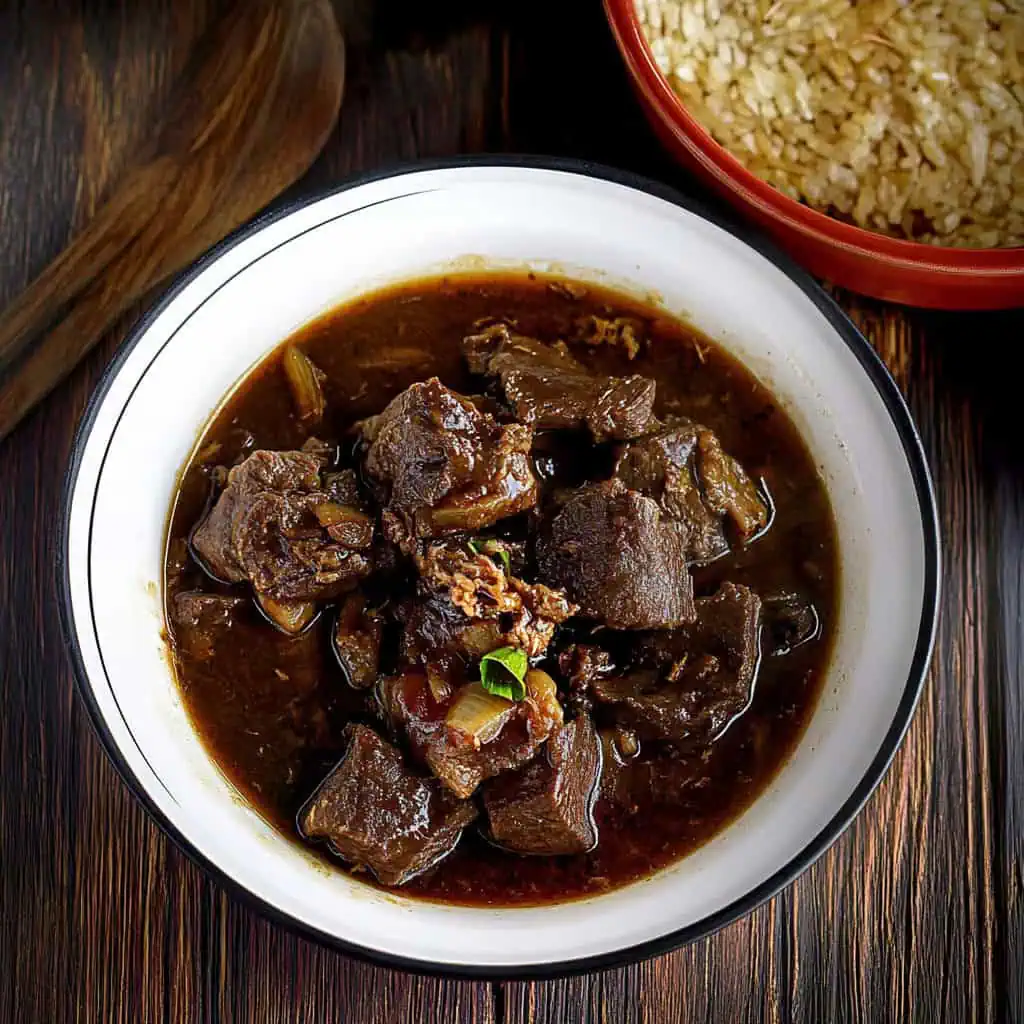
FAQ
Why is it called "Pares"?
"Pares" means "pairs" in Filipino, referring to the pairing of braised beef with garlic rice, though it traditionally comes as a trio with broth.
Can I make this in a pressure cooker?
Yes, reduce cooking time to 45 minutes at high pressure with natural release for the broth. Then follow the braising steps as directed.
How do I know when the beef is done?
The beef should easily break apart with a fork. If there's resistance, continue cooking until tender.
Can I make this ahead?
Yes, flavors actually improve overnight as the beef absorbs more of the sauce. Reheat gently before serving.
What makes the broth dark?
The combination of soy sauce and caramelized sugar creates the signature color. For a lighter color, reduce these ingredients slightly.
How can I make the dish less sweet?
Reduce the brown sugar to 2-3 tablespoons instead of ¼ cup. You can always add more to taste.
Is beef pares healthy?
Traditional beef pares is rich and caloric. For a healthier version, use leaner beef cuts, reduce sugar and sodium, and serve with brown rice.
Can I use a slow cooker?
Yes, after blanching the beef, cook on low for 6-8 hours or high for 4-5 hours until tender.
What side dishes go well with beef pares?
While beef pares is a complete meal, it pairs well with fresh cucumber slices, pickled vegetables, or a simple green salad for contrast.
Related
Looking for other recipes like this? Try these:
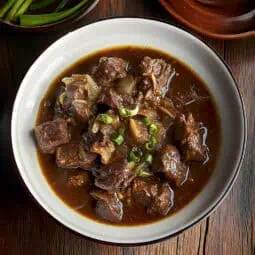
Filipino Beef Pares (Braised Beef)
Equipment
- Large heavy-bottomed pot (kaldero) For cooking the broth and ensuring even heat distribution
- Strainer [Salaan] For blanching the beef and achieving clear broth
- Sharp knife (kutsilyo) For cutting meat into uniform pieces
- Wok or large skillet (kawali) For making garlic fried rice
- Wooden spoon (sandok na kahoy) For stirring without scratching the pot
- Cheesecloth (telang pansala) Optional, for extra-clear broth
- Serving bowls (mangkok) Separate ones for soup and rice
- Meat thermometer (optional) To ensure beef is cooked to desired tenderness
Ingredients
For the Broth (Sabaw):
- 2 pounds beef brisket brisket ng baka, cut into 1½-inch cubes
- 6 cups water tubig
- 1 large white onion sibuyas, peeled and quartered
- 4 cloves garlic bawang, crushed
- 1 tablespoon whole black peppercorns pamintang buo
- 2 bay leaves dahon ng laurel
- 1 tablespoon salt asin
- Green onions chopped for garnish
For the Braised Beef (Beef Asado):
- 1 tablespoon cooking oil
- 1 onion finely chopped
- 3 cloves garlic minced
- 1- inch ginger luya, julienned
- 1 cup reserved beef broth
- ¼ cup soy sauce toyo
- ¼ cup brown sugar asukal na pula
- 2 pieces star anise
- Salt and pepper to taste
For the Garlic Rice (Sinangag):
- 4 cups day-old rice kanin
- ¼ cup oil
- 5 cloves garlic minced
- Salt to taste
Instructions
BROTH (SABAW):
- Start by blanching 2 pounds beef brisket: Bring 2 quarts water to a rolling boil (100°C/212°F). Add beef cubes and blanch for 8-10 minutes. Drain and rinse thoroughly (banlawan ng mabuti).
- In a clean pot, combine blanched beef with 6 cups fresh water (tubig), 1 quartered onion (sibuyas), 4 crushed garlic cloves (bawang), 1 tablespoon whole peppercorns (pamintang buo), 2 bay leaves (dahon ng laurel), and 1 tablespoon salt (asin). Bring to a gentle simmer (85-90°C/185-195°F) and maintain for 2-2½ hours, skimming as needed (alisin ang bula).
BRAISED BEEF (BEEF ASADO):
- While the broth simmers, heat 1 tablespoon oil in a separate pot over medium heat (160°C/320°F). Sauté finely chopped onion, minced garlic, and julienned ginger (luya) until fragrant (hanggang mabango).
- Add the tender beef from the broth and brown lightly. Add 1 cup reserved broth, ¼ cup soy sauce (toyo), ¼ cup brown sugar (asukal na pula), and 2 star anise. Reduce heat to low-medium (150°C/300°F) and simmer until sauce thickens (hanggang lumapot ang sarsa).
GARLIC RICE (SINANGAG):
- In a wok or large skillet, heat ¼ cup oil over low heat (130°C/266°F). Fry 5 cloves minced garlic until golden brown (hanggang maging golden brown). Remove and set aside.
- Increase heat to high (190°C/375°F). Using the garlic-infused oil, stir-fry 4 cups day-old rice (kanin) until heated through. Mix in the fried garlic and season with salt.
- Serve all components hot: Place garlic rice and braised beef in separate bowls, with the clear broth on the side. Garnish with chopped green onions.
Tips from Lola's Kitchen
- Use beef brisket with some fat marbling for the best flavor
- Never boil the broth aggressively - gentle bubbles only
- Prep garlic rice while beef is simmering to save time
- Toast star anise briefly before adding for enhanced aroma
- Add a piece of ginger to the broth to remove any gamey smell (malansa)
Nutrition
The Story Behind Filipino Beef Pares
Beef Pares emerged from the bustling streets of Manila in the 1970s, originating in Retiro Street, Quezon City, where the first "pares houses" began serving this ingenious combination of braised beef, garlic rice, and soup. The name "pares" (meaning "pairs" in Filipino) refers to the classic pairing of tender beef asado with sinangag (garlic fried rice), though ironically, it's served as a trio with the essential beef broth making it a complete meal.
What started as an affordable late-night meal for workers and taxi drivers soon became a beloved comfort food across all social classes in the Philippines. The dish cleverly combines Chinese cooking techniques (the braising method similar to hongshao rou) with Filipino flavors and eating habits. Local cooks adapted these methods to create something uniquely Filipino, using more accessible ingredients while maintaining the melt-in-your-mouth texture that makes this dish irresistible.
Today, pares houses dot every corner of Metro Manila and beyond, from humble street carts to air-conditioned restaurants. Each region has added its own twist to the basic recipe, but the core elements remain the same: beef slow-cooked until tender in a sweet-savory sauce, served with fragrant garlic rice, and accompanied by a steaming bowl of clear broth. This three-part harmony has become so iconic that many Filipinos consider it the ultimate hangover cure and comfort food, especially during rainy seasons or after long nights out.
The genius of beef pares lies in its versatility and value. While the original street food version typically uses beef brisket, home cooks have adapted the recipe to work with various cuts of beef, making it accessible for family meals while maintaining its soul-satisfying appeal. The dish exemplifies Filipino cuisine's talent for transforming simple ingredients into something extraordinary, creating maximum flavor with minimal fuss.
